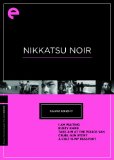| Reviews & Columns |
|
Reviews DVD TV on DVD Blu-ray 4K UHD International DVDs In Theaters Reviews by Studio Video Games Features Collector Series DVDs Easter Egg Database Interviews DVD Talk Radio Feature Articles Columns Anime Talk DVD Savant Horror DVDs The M.O.D. Squad Art House HD Talk Silent DVD
|
DVD Talk Forum |
|
|
| Resources |
|
DVD Price Search Customer Service #'s RCE Info Links |
|
Columns
|
|
|
Eclipse Series 17: Nikkatsu Noir- Criterion Collection
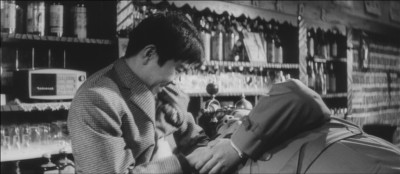
The Rusty Knife (1958). The Udaka police pinch their worst local mob boss, Katsumata, on a minor assault charge and plea with the public to come forward with any information that will help them keep the gangster in the clink. A minor criminal* informs the police that he and two others witnessed Katsumata murder a councilman a few years back and stage it like a suicide. Really all the rat wants is a payoff. Katsumata has the rat drowned and offers hush money to the two other witnesses, brothers Tachibana and Terada, who have been living the straight life.
Slinging drinks at a gin mill, Tachibana wants no part of any of this- he's even offended by the bribe- because he gave up the life of crime after stabbing and killing a gangster he suspected of raping his girlfriend. The younger, brasher, Terada, on the other hand, soon starts putting around town on a new motorcycle with his chippy on the back. The congressman's daughter, who is now a reporter, begins to plead with Tachibana to do the right thing, Terada gets in the thick of it after demanding more money, Tachibana uncovers new evidence about his girlfriends rapist, which naturally leads to Tachibana reemerging as the bloodthirsty scrapper he tried to put behind.
Noir Complex: Out Of The Past. Yujiro Ishihara, who played Tachibana and also reappears in I Am Waiting in this boxset, was one of Nikkatsu's big youth skewing screen idols. In his early scenes here, he is mellow and delicate, imagine Anthony Perkins, but it isn't long before his boyish face is snarl-carved, teeth gritting, wild eyed, and it is clear he is only out to bust heads with angst-ridden fists.
The fun here really lies in Ishihara and director Toshio Matsuda knows it, rarely letting scenes simmer too long without Ishihara vaulting forth with some "Just when I thought I was out, they drag me back in!" turmoil. The story and production is strictly the stuff of b-thrills and b-production. The plot moves quickly, the twists are flat and predictable, and its the kind of film you forgive a cheap truck ramming & chase scene where the trucks never touch it other because the cut away shots have Ishihara's Tachibana downright maniacally selling the wreckage he's causing.
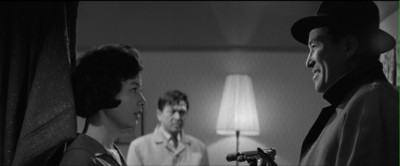
Take Aim At The Police Van (1960). Tamon is just your average bull escorting a bunch of low level cons when the transport is cut off and a sniper takes aim at the occupants, killing two. Tamon is left shouldering the blame and receives a suspension. Now with some time and mystery on his hands, Tamon sets out to dig up why a couple of nobodies were worthy of such an elaborate bump off. What Tamon uncovers is a web of white slavery, gangsters, blackmail, double crosses, a mystery-motivated moll, dead bodies, and it all leads to Tamon once again being in the cross-hairs.
Noir Complex: Lone Man Looking For Justice. Lead actor Michitaro Mizushima has a real everyman quality that combined with his middle age makes for a squaresville protagonist. You could imagine Mizushima headlining a Japanese version of Dragnet. He's very unlike the simmering cool anti-hero's that director Seijin Suzuki would later embrace. Suzuki even plays off his actors age when the stiff, grim-faced Mizushima tracks down one youthful, literally bebopping on the street corner, informant, who is mockingly spry enough to give the old man's knees a workout when he chases her. It's the kind of cute nod Suzuki was so fond of, always preferring some bit of visual cue and staging to embellish his characters over plain, verbose exposition.
The story and acting is sturdy, if standard, stuff, so it's really the execution and bursts of action that mark this one as a winner. Though obviously reigned in and still developing his style, you can see the evidence of the willful anarchistic spirit that would infamously lead to Suzuki's firing for making more experimental, surreal, and wide-appeal-be-damned pop films. Visually, its a solid piece. The storytelling is elliptical and transitions are nearly nonexistent. Like with Suzuki's Youth of the Beast and Underworld Beauty, there are the clear signs of an emerging artistic talent within a studio genre film.
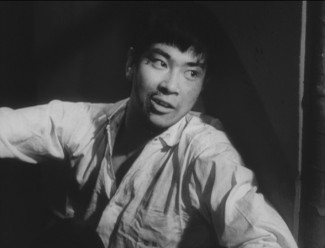
I Am Waiting (1957). In the middle of the night, ex-boxer Shimaki observes a forlorn waif shivering in the rain at the end of a pier near his shack of a restaurant. He offers the woman, Saeko, a place to get dry, a meal, and an ear to voice her troubles. She fears she killed or seriously injured her handler at a club where she is indebted to work. She was once a promising opera singer, bit by a cold that damaged her vocal cords. The songbird who lost her voice is now warbling at a gangsters club/clip-joint.
Shimaki too, tragically lost his way. He was an up and coming middleweight boxer, but, after letting loose and fatally pummeling a man in a streetfight, he can no longer bare facing anyone in the ring. He has spent the better part of a year waiting for word from his brother, who took all their capital to set up a new life in Brazil. Shimaki and Saeko seem perfect for each other, but just as they get cozy, the mobsters who own Saeko come to get her back and she obliges. Obsessed, Shimaki digs into his brothers disappearance with dark results that lead him right back to the past pining torcher.
Noir Complex: Two Troubled Souls. I Am Waiting is a standout in this set due to its introductory tone and atmosphere. The other films embrace the usual hard-scrabble noir action/mystery/crime tropes, channeling the hard knocks of Mickey Spillane or the highbrow pulp of Raymond Chanlder. In its early stages, Waiting spells it out plainly and is imbued with that other noir taste, that of loneliness and the bittersweet bleakness of Cornell Woolrich, James M. Cain, or Jim Thompson. For the first half/two thirds or so, it is a two person drama, trying to connect a couple of dream-shattered individuals living on the fringe, but the harsh fate of the (under)world conspires agaisnt them.
Hardly surprising since rebel screen idol Yujiro Ishihara was the films draw, the last stretch of the film largely drops Mei Kitahara's Saeko and focuses on Ishihara's Shimaki. As in The Rusty Knife, Ishihara is again complimented by Kitihara and his character is winningly calm and cool in the initial scenes and then bubbling with rage and turned into a single-minded vengeance seeker in the final stretch. As much as one feels the loss of Waiting ditching the early dramatic tone and the Seako-Shimaki dynamic, the end delivers pure noir goodness, a man tracking a mystery, out to avenge a personal loss, culminating with a final brawl between Shimaki and the lead gangster (Hideaki Nitani, in a commanding villain performance) that is a rough and tumble winner.
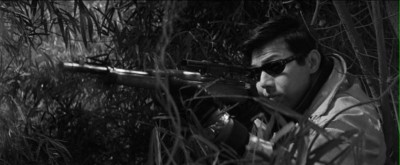
Cruel Gun Story (1964). Fresh out of the joint for killing a truck driver who ran over and crippled his sister, pure-hearted but deadly crook Joji Togawa is hired by a lip (that's a mob/illicit lawyer to youse that ain't wise) to pull off the heist of an armored pay truck transporting cash from the local racehorse track. His spotty crew includes a trusted friend, a shady gambler, some mush-brained muscle, and a doper weasel. Its the kind of rabble that has traded, oh say, 25 punches before they are even all in the same room. But, Joji needs the cash and it is a risk he feels is worth taking.
The plan goes off with only one hitch, they grab the whole truck and, what they didn't want, the guards inside it. That one wrong move means Joji's only ally gets a bullet in the arm. As if his greedy partners wanting to stab him in the back weren't bad enough, it seems the mob behind arranging and financing the job figures they'd be better off wasting the crew they puppeteered into pulling the hold-up and taking the whole cut for themselves.
Noir Complex: The Big Heist. Film fans will recognize the similarities between Cruel Gun Story's plot and that of Kubrick's The Killing, the latter being an obvious riffing point. The likenesses are mostly surface, the idea of a racetrack robbery and the crew is somewhat the same. Killing's Lady Macbeth character is surprisingly transformed into a love interest for star Joe Shishido. It almost goes without saying, as good as Cruel's supporting crew is, few can match the character actor grandiosity of Timothy Carey and Elisha Cook. The heist is also scaled back, rerouting the pay truck down a back road, sniping the motor patrol accompaniment, and then hauling the truck away. The biggest deviation is that Cruel doesn't culminate with the robbery and instead focuses its end on the men getting double-crossed and our lead robber penniless, beaten, desperate, and aiming for revenge.
A nice gritty number. Director Takumi Furukawa does a good job of creating a world where the men cannot trust each other and seem to drift from one crummy (US soldier abandoned) locale to another while waiting, praying, and scheming for their payoff. While one is reminded of The Killing in the early going, the last half of the movie plays on its own and manages its own twist finale that, while not as clever as The Killing, is just as fittingly bleak.
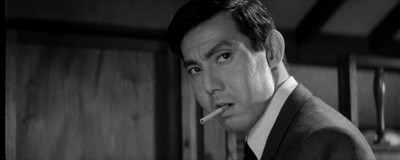
A Colt Is My Passport (1967). Ace hitman Shuji Kamimura is hired by the Otawara clan to bop the head of their rival's the Shimazu. Along with his aide Shun, Kamimura gets the job done and makes for his escape only to find the airport crawling with Shimazu goons. The two make their way to an underworld truckstop safehouse and await further instructions. Shun makes eyes at the safehouse maid Mina, who is a dejected dish left broken-hearted by a Shimazu right-hand man. Lucky that she takes to the two men because they need all the friends they can get. During the downtime waiting for a new escape route, the Otawara's and Shimazu make peace, one of the tenants of their arrangement being that they offer up the hired hitman.
Noir Complex: A Killing Life. First of all, the title alone belongs in the pantheon of greatest crime film marquees. For my money, this is the best film in the set. Coming late in the cycle, Colt spices things up with a blatant nod to the Spaghetti Westerns that had become a craze just a few years earlier. Director Takashi Nomura doesn't waste a single frame, capturing the boxed-in paranoia of his men on the run and acing a great man against the odds finale set agaisnt the backdrop of a desolate landfill that might as well be the Southwestern desert minus the buttes on the horizon and tumbleweeds rolling across the foreground.
Star Joe Shishido is in fine, understated form here. The picture couldn't have come at a better point in his career. The world-weary hitman who's seen it all parallels his own acting career and lived-in comfort with these tough guy roles. Which isn't to say Shishido's just channeling what he had done before without some subtlety. Compare with his Cruel Gun Story or Branded To Kill's cooler and brasher characters, here he is the picture of wise but solemn confidence. The film just hits all the right notes, expressive direction, memorable score, caught in a corner heroes, the mentor/protege/father/son dynamic between Shishido and co-star Jerry Fujio, the lonely damsel, the sneering villains, and a memorable, pulse-quickening finale.
The DVDs: Criterion Collection/Eclipse Series 17.
The packaging consists of five slimline cases housed within an open-ended slipcase.
Picture:
All of the films are black and white and presented in Anamorphic Widescreen except for I Am Waiting which is in Standard Fullscreen. The quality across the anamorphic titles is quite good, with Colt, Take Aim, and Cruel sharing a similar standard of solid details, nice sharpness, satisfactory grain level, and deep contrast. Rusty Knife and particularly Waiting have rougher, brighter, less detailed prints. Overall, the defects are pleasantly minimal. The usual round of timeworn print problems like a bit of flicker here, a bit too much grain there, but they are, for the most part, technically sound and more than acceptable for transfers of this ilk.
Sound:
Every film is presented in Japanese Mono with optional English subtitles. All tracks are in pretty good shape. Considering their age, fairly clean and tidy with minimal moments of hiss, pops, distortions, and the like. The scores for Cruel Gun Story and A Colt Is My Passport are especially standout. Cruel has a great bouncy urgency bolstered by driving percussion and horns. Colt has themes featuring fantastic, oh so familiar, Morriconeesque jangling guitar, whistling, and harmonica backing. Subs are excellent, appearing well-timed and translated.
Extras:
The sole extra for every film are some intelligent, praise leaning Liner Notes by Chuck Stephens. Comments are limited to one-pagers, except for I Am Waiting which gets three-page treatment.
Conclusion:
While none of the films here are a Japanese Asphalt Jungle or Double Indemnity, this is set is one of the better non-series/director box sets I've run across because the Nikkatsu Noir Collection doesn't just showcase you a couple of films with a similar feel but examples that have their own tones and distinct subgenre types. By the end of the set, you are left with a wide swath of noir film styles from a decade in which the studio pumped them out on a concession line. Sure, there is some subtle symbolism and social commentary to be found in some of the films, but overall its about hard-boiled thrills within a pulp environment over art and intellectualism. In keeping with the Eclipse line, Criterion offers transfers with the basics, single layer, scuffed but passable prints, and few extras with a price point to match.
*Technically, Joe Shishido shows up three, not two times, but his pre-stardom role in Rusty Knife is fleeting.
|
| Popular Reviews |
| Sponsored Links |
|
|
| Sponsored Links |
|
|
| Release List | Reviews | Shop | Newsletter | Forum | DVD Giveaways | Blu-Ray | Advertise |
|
Copyright 2024 DVDTalk.com All Rights Reserved. Legal Info, Privacy Policy, Terms of Use,
Manage Preferences,
Your Privacy Choices | |||||||









